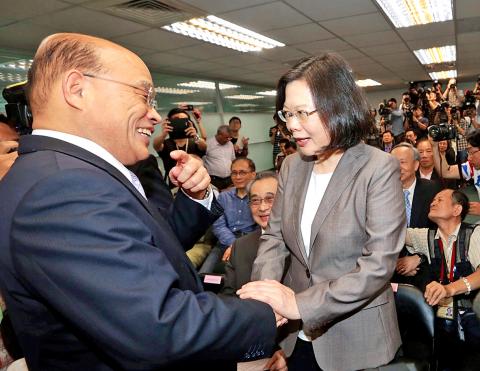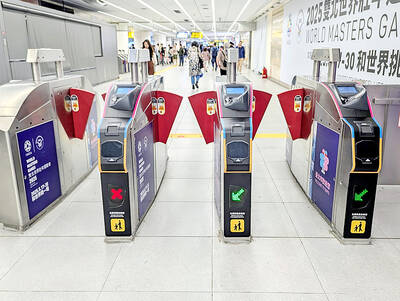Tsai Ing-wen (蔡英文) yesterday officially assumed the chair of the Democratic Progressive Party (DPP), vowing to succeed in November’s seven-in-one elections and change the party by promoting an internal “generational shift” and “reconnecting” it with society.
“It is time for action — it is time to roll up the sleeves and go to work. We won’t be able to change the country unless we make changes to our party first,” Tsai said at the handover ceremony in Taipei at which she took the helm of the party from her predecessor, Su Tseng-chang (蘇貞昌).
As Tsai began her third two-year term as chairperson, having headed the party between 2008 and 2012, she laid out three tasks for the DPP: winning the seven-in-one elections in November; ensuring that it is a party for the public that stands on the same side as the public; and nurturing young politicians to lay the foundations of its bid to return to power.

Photo: CNA
Furthermore, Tsai said that the New Frontier Thinktank — the party’s official think tank — is to be transformed into a platform on which the party is able to engage in dialogue with civic groups, representatives from sub-sectors of society and international experts to enable it to formulate better policies.
The 57-year-old former presidential candidate has tapped DPP Representative to the US Joseph Wu (吳釗燮), who served as DPP Policy Research Committee executive director under Su, as secretary-general — the most important position in the party.
Wu, who would retain his position as US representative, later confirmed Tsai’s appointments for several key party posts, some of which raised some eyebrows, such as the naming of DPP Legislator Tuan Yi-kang (段宜康), 50, as the committee’s new executive director and 41-year-old fellow lawmaker Chao Tien-lin (趙天麟) being made director of the party’s Department of China Affairs.
Tsai also made student activist Fu Wei-che (傅偉哲) — who is under 30 — director of the party’s Department of Youth Development and installed film director Liao Chi-kuei (廖錦桂) as one of her two deputy secretaries-general, while Wu said Hung Yao-fu (洪耀福), the spokesperson for Tsai’s office, would serve as the other deputy secretary-general.
In addition, women’s rights advocate Lin Ching-yi (林靜儀) was selected to be head the Department of Women’s Development, while 36-year-old Tai Chi-chuan (戴季全), who founded technology news site Techorange.com and Richi Technology Inc, assumed the post of Internet Department director.
Tsai kept Lin Chun-hsien (林俊憲) on her spokesperson team, which also includes Taipei City Councilor Hsu Chia-ching (徐佳青) and lawyer Huang Di-ying (黃帝穎).
After a tumultuous two-year term, Su bid farewell to his colleges in his final speech as chairman, saying he believed the party should stay confident in its core values, as well as in its dealings with the Chinese Nationalist Party (KMT) and the government in Beijing.
In what appeared to be a hint about his future, Su, who was set to run for re-election as party chair before abruptly dropping out of the race on April 15, said he “now realized that sometimes it’s better to take things slowly.”
“Without occupying an official party position, I feel I will have more time to devote my energy and passion to the Taiwanese populace. Hopefully, I will someday get the opportunity to pay back the debt I owe to the public,” Su said before leaving party headquarters.
Su and his aides are expected to work for his Eball Foundation.

A magnitude 6.4 earthquake struck off the coast of Hualien County in eastern Taiwan at 7pm yesterday, the Central Weather Administration (CWA) said. The epicenter of the temblor was at sea, about 69.9km south of Hualien County Hall, at a depth of 30.9km, it said. There were no immediate reports of damage resulting from the quake. The earthquake’s intensity, which gauges the actual effect of a temblor, was highest in Taitung County’s Changbin Township (長濱), where it measured 5 on Taiwan’s seven-tier intensity scale. The quake also measured an intensity of 4 in Hualien, Nantou, Chiayi, Yunlin, Changhua and Miaoli counties, as well as

Credit departments of farmers’ and fishers’ associations blocked a total of more than NT$180 million (US$6.01 million) from being lost to scams last year, National Police Agency (NPA) data showed. The Agricultural Finance Agency (AFA) said last week that staff of farmers’ and fishers’ associations’ credit departments are required to implement fraud prevention measures when they serve clients at the counter. They would ask clients about personal financial management activities whenever they suspect there might be a fraud situation, and would immediately report the incident to local authorities, which would send police officers to the site to help, it said. NPA data showed

ENERGY RESILIENCE: Although Alaska is open for investments, Taiwan is sourcing its gas from the Middle East, and the sea routes carry risks, Ho Cheng-hui said US government officials’ high-profile reception of a Taiwanese representative at the Alaska Sustainable Energy Conference indicated the emergence of an Indo-Pacific energy resilience alliance, an academic said. Presidential Office Secretary-General Pan Men-an (潘孟安) attended the conference in Alaska on Thursday last week at the invitation of the US government. Pan visited oil and gas facilities with senior US officials, including US Secretary of the Interior Doug Burgum, US Secretary of Energy Chris Wright, Alaska Governor Mike Dunleavy and US Senator Daniel Sullivan. Pan attending the conference on behalf of President William Lai (賴清德) shows a significant elevation in diplomatic representation,

The Taipei MRT is to begin accepting mobile payment services in the fall, Taipei Rapid Transit Corp said on Saturday. When the company finishes the installation of new payment units at ticketing gates in October, MRT passengers can use credit cards, Apple Pay, Google Pay and Samsung Pay, the operator said. In addition, the MRT would also provide QR payment codes — which would be compatible with Line Pay, Jkopay, iPass Money, PXPay Plus, EasyWallet, iCash Pay, Taiwan Pay and Taishin Pay — to access the railway system. Currently, passengers can access the Taipei MRT by buying a single-journey token or using EasyCard,